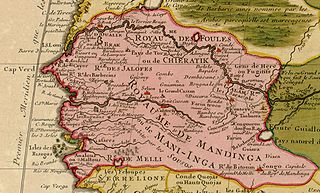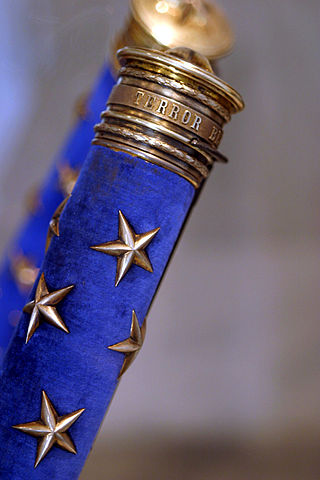Related Research Articles

The history of Senegal is commonly divided into a number of periods, encompassing the prehistoric era, the precolonial period, colonialism, and the contemporary era.

The Hôtel des Invalides, commonly called Les Invalides, is a complex of buildings in the 7th arrondissement of Paris, France, containing museums and monuments, all relating to the military history of France, as well as a hospital and a retirement home for war veterans, the building's original purpose. The buildings house the Musée de l'Armée, the military museum of the Army of France, the Musée des Plans-Reliefs, and the Musée d'Histoire Contemporaine. The complex also includes the former hospital chapel, now national cathedral of the French military, and the adjacent former Royal Chapel known as the Dôme des Invalides, the tallest church building in Paris at a height of 107 meters. The latter has been converted into a shrine of some of France's leading military figures, most notably the tomb of Napoleon.

The Prix de Rome or Grand Prix de Rome was a French scholarship for arts students, initially for painters and sculptors, that was established in 1663 during the reign of Louis XIV of France. Winners were awarded a bursary that allowed them to stay in Rome for three to five years at the expense of the state. The prize was extended to architecture in 1720, music in 1803 and engraving in 1804. The prestigious award was abolished in 1968 by André Malraux, then Minister of Culture, following the May 68 riots that called for cultural change.

Marshal of France is a French military distinction, rather than a military rank, that is awarded to generals for exceptional achievements. The title has been awarded since 1185, though briefly abolished (1793–1804) and for a period dormant (1870–1916). It was one of the Great Officers of the Crown of France during the Ancien Régime and Bourbon Restoration, and one of the Grand Dignitaries of the Empire during the First French Empire.

Île de Gorée is one of the 19 communes d'arrondissement of the city of Dakar, Senegal. It is an 18.2-hectare (45-acre) island located 2 kilometres at sea from the main harbour of Dakar, famous as a destination for people interested in the Atlantic slave trade although its actual role in the history of the slave trade is the subject of dispute.

The Colonial School was a French public higher education institution or grande école, created in Paris in 1889 to provide training for public servants and administrators of the French colonial empire. It also was a center for research in geography, anthropology, ethnology and other scientific endeavors with a focus on French-administered territories.
The Prefect of Saint Pierre and Miquelon is the local representative of the President of France in Saint Pierre and Miquelon, and in effect the governor or executive officer of the territory.
The Four Communes of Senegal were the four oldest colonial towns in French West Africa. In 1848 the Second Republic extended the rights of full French citizenship to the inhabitants of Saint-Louis, Dakar, Gorée, and Rufisque. While those who were born in these towns could technically enjoy all the rights of native French citizens, substantial legal and social barriers prevented the full exercise of these rights, especially by those seen by authorities as "full-blooded" Africans. Most of the African population of these towns were termed originaires: those Africans born into the commune, but who retained recourse to African and/or Islamic law. Those few Africans from the four communes who were able to pursue higher education and were willing to renounce their legal protections could "rise" to become termed Évolués (Evolved) and were nominally granted full French citizenship. Despite this legal framework, Évolués still faced substantial discrimination in Africa and the Metropole alike.
The Archives Nationales du Sénégal is headquartered in Dakar, in the "Central Park" building on Avenue Malick Sy. It was first called "Archives Nationales" in 1962, but the collection existed since 1913 as the archives of the colonial French West Africa administration. It moved from Saint-Louis to Dakar after 1958.
The Commission des Sciences et des Arts was a French scientific and artistic institute. Established on 16 March 1798, it consisted of 167 members, of which all but 16 joined Napoleon Bonaparte's conquest of Egypt and produced the Description de l'Égypte. More than half were engineers and technicians, including 21 mathematicians, 3 astronomers, 17 civil engineers, 13 naturalists and mining engineers, geographers, 3 gunpowder engineers, 4 architects, 8 artists, 10 mechanical artists, 1 sculptor, 15 interpreters, 10 men of letters, 22 printers in Latin, Greek and Arabic characters. Bonaparte organised his scientific 'corps' like an army, dividing its members into 5 categories and assigning to each member a military rank and a defined military role beyond his scientific function.
Jacques Cornano is a French politician who was elected to the French Senate on 25 September 2011, representing the Department of Guadeloupe.
The following is a timeline of the history of the city of Dakar, Senegal.

The National Order of the Lion is the highest order of Senegal.
The following is a timeline of the history of the city of Saint-Louis, Senegal.
References
- 1 2 3 4 5 6 7 8 9 Zuccarelli 1973.
- 1 2 G. Wesley Johnson (1991). Naissance du Sénégal contemporain: aux origines de la vie politique moderne (1900-1920) (in French). Paris: Éditions Karthala. ISBN 978-2-86537-277-5.
- ↑ Moniteur du Sénégal et dépendances: journal officiel (in French), Saint-Louis, 1871
- This article incorporates information from the French Wikipedia.